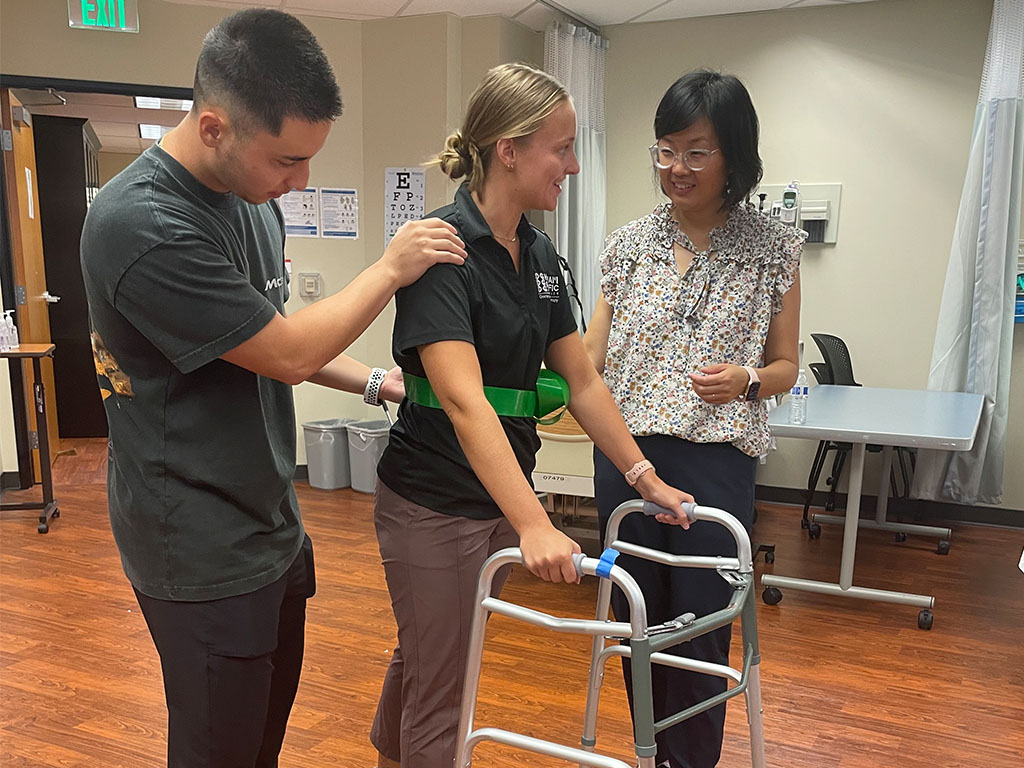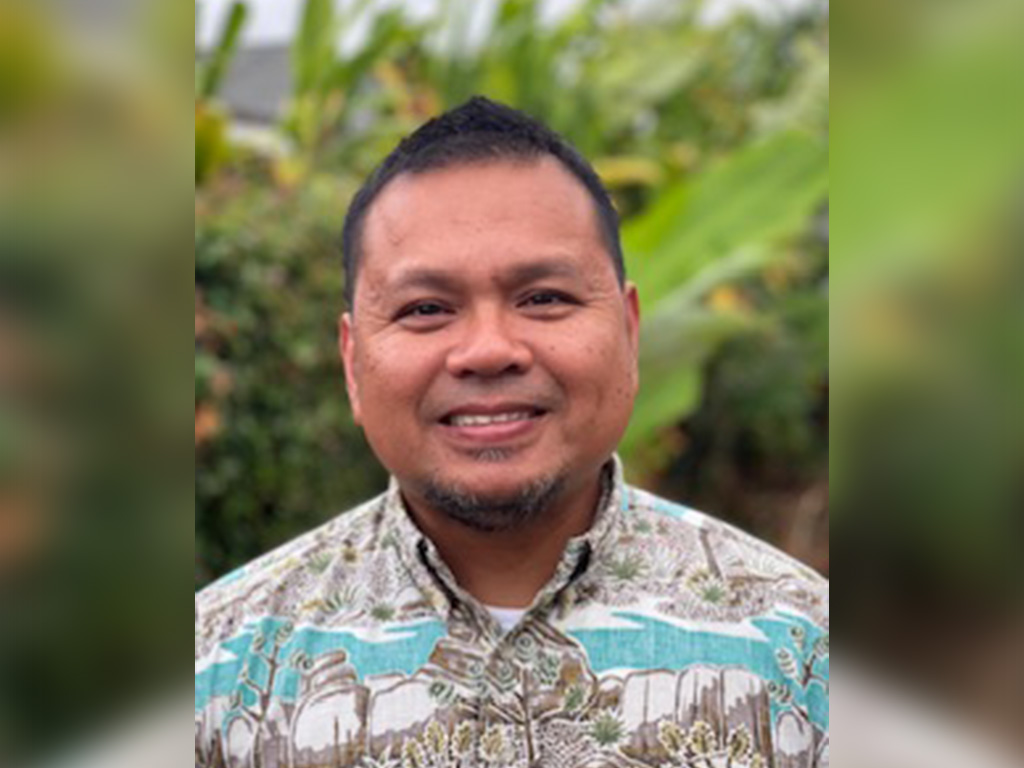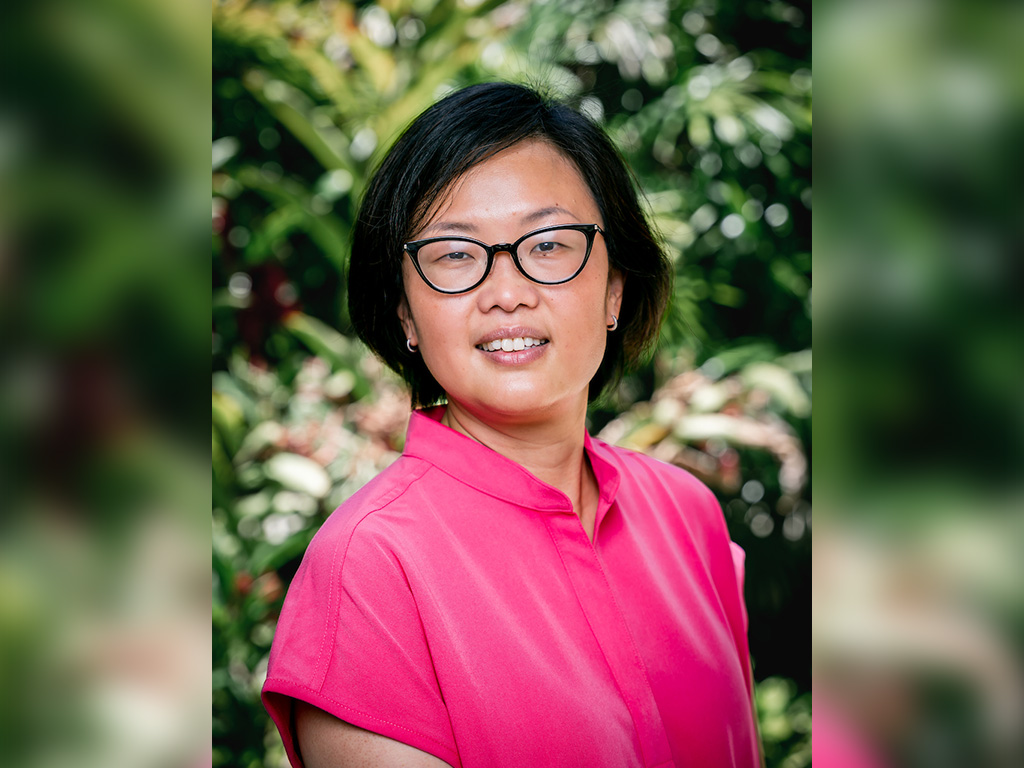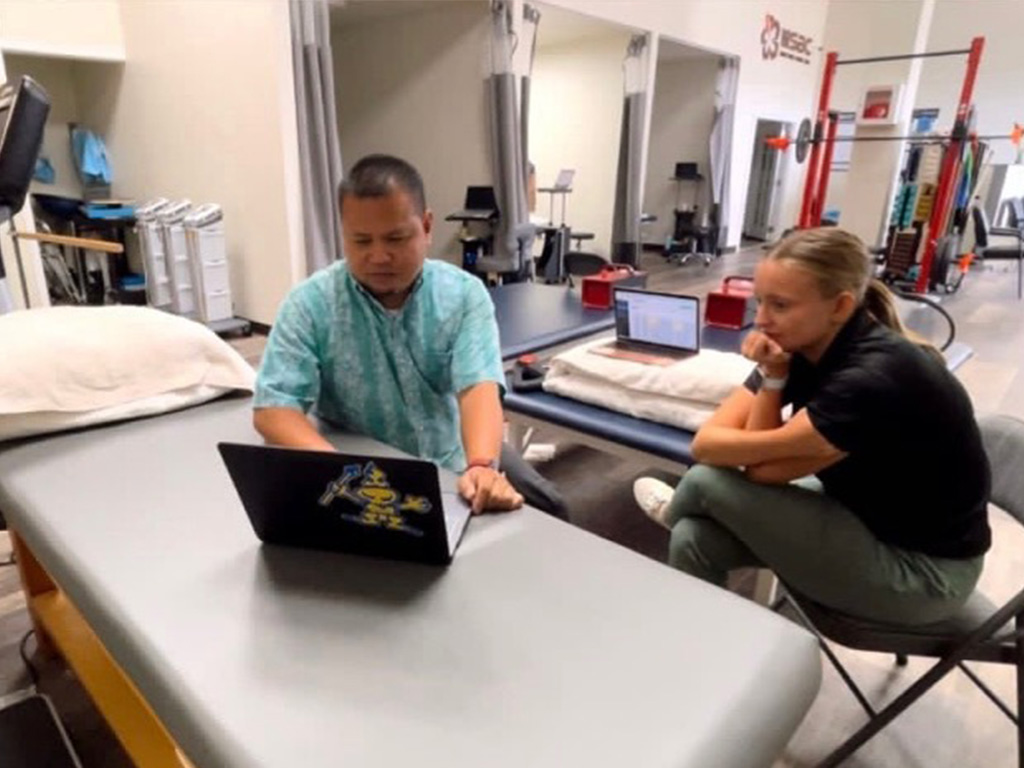
Qing Zhang, DPT, (far right) with Class of 2024 DPT students Daniel Rodriguez and Kennedy Schuelke in the Management of Complex Patients lab.
Each October, National Physical Therapy Month (NPTM) shines a spotlight on the hard work and dedication of physical therapists and their invaluable contributions to patient care. This year, HPU celebrates NPTM by recognizing its esteemed Physical Therapy program and the remarkable journeys of two faculty members who have dedicated their lives to this profession.
"In 2020, physical therapy celebrated its centennial anniversary in the United States, marking a century of transformation and evolution. Today, physical therapists have emerged as key players in medical triage, working alongside surgeons and other medical professionals. The journey of physical therapy from its humble beginnings as a technician-driven field to its current status as a doctoring profession is a testament to its enduring importance in healthcare," said Meynard Enriquez, DPT, an adjunct faculty member at HPU.

Meynard Enriquez.
Qing Zhang, DPT, an assistant professor at HPU's Physical Therapy program, shared her journey and insights into the profession. Her path to becoming a physical therapist is a testament to determination, cultural adaptation, and a profound commitment to improving patients' lives.
Reflecting on her career, Zhang shared “My unique path to becoming a physical therapist began with a medical doctor degree and practice in China.” However, the limited patient interaction led her to seek a more meaningful way to impact patients' lives.
Zhang transitioned to the United States and embarked on a journey to become a physical therapist that would allow her to fulfill the dream of forming deeper connections with patients. She enrolled in the Doctor of Physical Therapy program at the University of Nevada Las Vegas and later completed neurologic physical therapy residency training at Creighton University.
During her first year in the DPT program, Zhang grappled with language barriers, having to learn English from scratch. As she advanced, effective communication with patients proved challenging due to cultural differences, making it difficult to navigate appropriate questions. Despite these obstacles, she remained resolute in pursuing her dream to become a physical therapist.
Reflecting on her career, Zhang shared, "My journey towards becoming a physical therapist has been a unique one. Initially, the path was chosen for me by my parents, who encouraged me to pursue a career as a medical doctor.” This transition, driven by a desire for more meaningful patient interactions, has been nothing short of extraordinary.

Qing Zhang.
She explained further, “While my journey to become a physical therapist was marked by challenges and excitement, it was also enriched by the unwavering support of mentors and friends who made this transformational journey meaningful. Their guidance and encouragement have played a pivotal role in shaping my career and my commitment to becoming an excellent physical therapist.”
Enriquez’s journey into the profession of physical therapy is also a testament to the dedication required to excel in this industry. He graduated with a master’s degree in physical therapy in 2002 and later earned his Doctorate from AT Still University. His early career saw him working with a diverse range of patients, from those with spinal cord injuries and brain injuries to pediatric cases and professional athletes in Major League Soccer.
However, it was during his time in private practice that Enriquez faced unexpected challenges within the competitive healthcare system. He reflected on those times, saying, “It made for an environment which was very competitive between clinics and between PTs themselves, which ultimately stifles the growth of the profession.”
His perspective underwent a profound shift when he completed his orthopedic fellowship at Regis University, a Jesuit institution that instilled a mission to serve others and promote the greater good. Enriquez realized that true success in physical therapy lies in helping others excel and planting seeds of excellence in them. This newfound philosophy led him to become a tireless advocate for the profession and eventually a dedicated educator.

Meynard Enriquez, DPT, (left) with Class of 2024 DPT student Kennedy Schuelke in clinic.
“Becoming a physical therapy educator is a unique path. Although I initially served as a clinical instructor, I spent 20 years in clinical practice before transitioning into teaching. Completing my board certification in orthopedics and an orthopedic manual therapy fellowship exposed me to numerous clinicians from across the country who were eager to share their knowledge,” Enriquez explained.
This experience fueled his desire to teach aspiring physical therapists. HPU’s Doctor of Physical Therapy program, known for its balance of career academicians and clinicians, provided the ideal environment for him to nurture the next generation of physical therapists.
Enriquez’s motivation as an educator stems from his commitment to helping students become the best versions of themselves. He believes that every struggling student possesses the potential for greatness and that educators should tailor their teaching to harness each student’s strengths while addressing their weaknesses.
“I learned early in clinical practice that every single patient is different,” Enriquez noted. “Adjusting to those differences makes the patient experience most successful. The same can be applied to teaching, and it is our job to try and adjust to promote the best learning.”
Both Zhang and Enriquez's journeys underscore the dedication and resilience required to excel in the field of physical therapy. Their experiences serve as a source of inspiration for students pursuing this noble profession at HPU.
“While working as a PT, I realized I could only directly help a limited number of patients daily. However, by becoming an educator, I could have a broader impact by instilling the values and practices of high-quality care in new PTs, who, in turn, would go on to help more people. One of the most rewarding aspects of being a PT educator is watching my students pursue their dreams of becoming physical therapists and witnessing their growth, both professionally and personally,” Zhang said.
As NPTM emphasizes the "Value of PT" this year, Zhang emphasized the economic benefits of physical therapy and the need to recognize its broader impact on enhancing the quality of life. Physical therapists are movement experts who contribute to society's overall health by providing tangible economic benefits while improving patient outcomes.
"The growing popularity of HPU's hybrid Doctor of Physical Therapy program reflects the changing landscape of education in the field. This hybrid format offers students flexibility in their learning journey, allowing them to study course materials at their own pace while engaging in synchronous sessions that foster practical application of knowledge," Zhang explained.
The hybrid program combines online learning with in-person lab immersion experiences, encouraging active participation and discussion during class hours. This format empowers students to become lifelong learners who can pursue self-directed education even after graduation.
Furthermore, the program reinforces self-learning habits in students, preparing them for the evolving needs of the profession. The hybrid format aligns with the dynamic nature of physical therapy and equips students with the skills needed to excel in the field.
Zhang and Enriquez both foresee significant trends and techniques emerging in physical therapy that will shape the future of patient care. Evidence-based practice, health informatics, and the integration of advanced technologies are expected to play pivotal roles in the evolving landscape of physical therapy.
As Hawai‘i Pacific University's Physical Therapy program celebrates National Physical Therapy Month, the journeys of faculty members like Qing Zhang and Meynard Enriquez serve as inspirations to aspiring physical therapists. Their dedication, resilience, and commitment to excellence highlight the enduring importance of physical therapy in patient care. With the ever-evolving landscape of healthcare, physical therapy remains at the forefront, guided by evidence-based practices, technological advancements, and a deep commitment to improving patients' quality of life.


